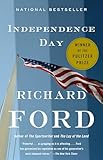Bezalel Stern is a lawyer and freelance writer who lives in New York. He is currently at work on his first novel about the life and times of a Wall Street day trader.
 For some obvious reasons (and others not quite so obvious) around this time of year I often go back to Richard Ford’s masterful novel Independence Day. Independence Day, the second book in the Frank Bascombe trilogy, revolves around the eponymous holiday. It takes place, like the other books in the trilogy, over a single weekend. Also like the other two books, it aims not just to chronicle a couple of days in the life of its narrator, but also to digest the ethos of the holiday into a concrete space.
For some obvious reasons (and others not quite so obvious) around this time of year I often go back to Richard Ford’s masterful novel Independence Day. Independence Day, the second book in the Frank Bascombe trilogy, revolves around the eponymous holiday. It takes place, like the other books in the trilogy, over a single weekend. Also like the other two books, it aims not just to chronicle a couple of days in the life of its narrator, but also to digest the ethos of the holiday into a concrete space.
Independence Day is especially relevant, perhaps, this year, as the book’s backdrop is the 1988 financial and housing slump, which, when reading Frank Bascombe’s perspective of it, at least, seems awfully similar to the contemporary housing crisis. Bascombe, a former fiction writer cum sportswriter, is now a real estate agent, and one who seemed to have gotten into the gig at the worst possible time. The heady buying frenzy of the arguably irresponsible Reagan years is coming to an abrupt end, as home values are on the verge of a steep and then virtually unprecedented decline, and the economy teeters toward a freefall (history does seem to repeat itself, doesn’t it). Frank Bascombe, a lonely divorcee with two children he hardly ever sees and an on again off again girlfriend, is in a sort of freefall of his own. He is simply trying, as the book begins, to remain independent, from relationships, from feelings, from everything. In a word, Bascombe is simply trying to exist. It is no surprise, then, that he terms this period in his life the “Existence Period”.
The problem is that, as Bascombe comes to realize, it is hard to simply exist in a world where you have to interact with others. And so, over the course of a jam-packed four day weekend during which Frank interacts with all sorts of Americans of different socio-economic, religious, and racial backgrounds (this is no accident, of course), Frank slowly learns to wean himself away from the dependencies of the Existence Period. Meanwhile, Frank’s teenage son, Paul, who’s meant to stand for the wrong kind of independence (but because the novel is so well written, comes across as much more than a simple metaphor), loses himself in anger and alienation. While he is free, in a sense, Paul seems adrift, unable to know what he is declaring his independence from or his allegiance to.
Ford is a masterful storyteller. In my opinion, he’s one of the great American novelists writing today. I find the layers of his Bascombe novels in particular – each sentence seems virtually packed with meaning and thought – just short of miraculous. Independence Day is a book that, especially in times of national instability (and, dare I say it, crisis?) bears a second (or third) read.
It’s amazing to me the way Ford can make simple truths not simply seem profound, but actually be profound. So, by the end of the novel, when, after having thrown around Emerson and Jefferson and revolutionary philosophy, Frank comes to the conclusion that true independence means not going it alone, but dealing with the world around you in a mature and concentrated manner, interacting with and building relationships with others; when, in other words, Frank leaves his Existence Period for a new, perhaps scarier, more challenging, but certainly more fulfilling life of personal interactions that matter, the verities Frank Bascombe professes no longer seem so simple.
The book contains ideas worth thinking about, and seriously. True independence, for Ford, consists, it seems to me at least, of actually being able to understand why people who are different from yourself – perhaps incredibly so – do what they do. In being able to work with them, and to learn from them as well.
“The original framers” of the constitution, Frank says at one point in the novel, “wanted to be free to make new mistakes, not just to keep making the same old ones over and over as separate colonies and without showing much progress. That’s why they decided to band together and be independent and were willing to sacrifice some controls they’d always had in hopes of getting something better.”
People who have practically nothing in common banding together to be independent. As counterproductive as it sounds, it’s what made this country free. Real independence, Ford posits, is all about making connections. Independence is with people.








